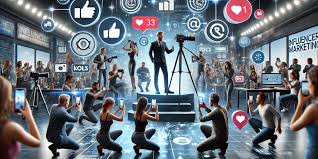In a world that’s more interconnected than ever, influencer marketing agencies marketing agencies play an essential role in bridging the gap between brands and their audiences. The modern marketing agency is no longer limited to simple ad placements or brand promotions; it’s now a strategic partner, a data analyst, and a creative powerhouse. This evolution reflects the rising complexity of consumer behavior, digital tools, and the global marketplace, pushing agencies to adapt and transform continuously.
1. The Changing Landscape of Marketing Agencies
In the early days, marketing agencies primarily focused on print advertising, television commercials, and direct mail. Their goal was to help brands increase visibility and reach a wider audience. However, with the advent of the internet and the rapid evolution of digital technology, the landscape of marketing has shifted dramatically. Today, marketing agencies are more tech-savvy, data-driven, and innovative than ever, offering a suite of services designed to build brand loyalty, engage customers, and foster growth in an increasingly digital environment.
2. Core Services of a Modern Marketing Agency
Today’s marketing agencies provide a variety of services that cater to every facet of brand development and consumer engagement:
- Brand Strategy and Positioning: Developing a brand’s identity and positioning it within the competitive landscape is essential for long-term success. Agencies conduct in-depth market research to identify unique selling points and create a coherent strategy for brand positioning.
- Content Creation and Management: Content is at the heart of digital marketing. Agencies create a broad array of content, including blog posts, social media updates, videos, and podcasts, to keep audiences engaged across platforms.
- SEO and SEM (Search Engine Optimization and Marketing): Ensuring that a brand’s content is discoverable on search engines is key to online visibility. Agencies work on optimizing websites, conducting keyword research, and managing pay-per-click (PPC) advertising to drive traffic and increase conversions.
- Social Media Marketing: With the popularity of social media platforms, agencies curate content strategies to engage audiences, increase followers, and boost brand awareness on platforms such as Instagram, Facebook, LinkedIn, and TikTok.
- Email Marketing and Automation: Email remains a powerful tool for nurturing leads and maintaining customer loyalty. Agencies develop personalized email campaigns, segment audiences, and use automation to reach customers at the right moment with the right message.
- Influencer and Affiliate Marketing: Leveraging influencers and affiliate marketers has become an essential part of the modern marketing mix. Agencies manage relationships with influencers to drive brand visibility, increase credibility, and reach targeted audiences.
3. The Role of Data and Analytics
One of the defining aspects of the modern marketing agency is its reliance on data. With tools like Google Analytics, Facebook Insights, and advanced CRM (Customer Relationship Management) software, agencies can track customer behavior, measure campaign effectiveness, and make data-driven decisions. Analytics not only help in understanding what works but also in forecasting trends and adjusting strategies on the fly, allowing brands to remain agile in a rapidly changing market.
4. The Rise of Full-Service and Niche Marketing Agencies
Marketing agencies today often fall into two categories: full-service and niche agencies.
- Full-Service Agencies: These agencies offer a comprehensive suite of marketing services, allowing brands to have all their marketing needs handled in one place. Full-service agencies are typically ideal for companies that prefer an integrated approach to marketing or that lack an in-house marketing team.
- Niche Agencies: Specialized or niche agencies focus on specific industries or services, such as SEO, influencer marketing, or branding. For example, a brand in the fashion industry might choose an agency that specializes in fashion marketing. Niche agencies are valuable for companies that need targeted expertise in a particular area of marketing.
5. The Importance of Creativity in Marketing Agencies
While data and analytics have become increasingly important, creativity remains a crucial component of successful marketing. Agencies need to craft memorable campaigns that capture attention and resonate emotionally with audiences. Creative teams, including designers, writers, and strategists, work collaboratively to develop unique campaigns that align with a brand’s voice and values.
6. Embracing Emerging Trends and Technologies
To stay competitive, marketing agencies must stay ahead of the curve and adapt to emerging trends and technologies. Some of the latest trends shaping the industry include:
- AI and Machine Learning: Artificial intelligence is transforming how agencies approach customer insights, personalization, and predictive analysis. Machine learning algorithms can process vast amounts of data to create targeted campaigns, optimize ad spend, and even generate content.
- Voice and Visual Search: With the increasing popularity of smart speakers and image-based search, agencies are adapting SEO strategies to ensure that brands are optimized for voice and visual search.
- AR/VR Marketing: Augmented reality (AR) and virtual reality (VR) offer interactive experiences that enhance customer engagement. Agencies are leveraging these technologies to create immersive experiences that allow customers to interact with products and brands in a whole new way.
- Sustainability and Social Responsibility: More consumers are prioritizing brands that align with their values, especially around issues of sustainability and social impact. Marketing agencies are increasingly helping brands communicate their corporate social responsibility (CSR) efforts in a way that resonates with socially conscious consumers.
7. The Future of Marketing Agencies
The future of marketing agencies lies in the continued integration of technology and creativity. As customer expectations rise and digital platforms evolve, agencies will need to keep innovating to deliver results. This might involve investing in AI-driven tools, expanding virtual and augmented reality capabilities, and fostering closer relationships with clients to ensure a seamless alignment of brand values and marketing objectives.
In this evolving landscape, the best agencies will be those that balance data and creativity, embrace technological advancements, and, above all, stay attuned to the needs and desires of their audiences. Marketing agencies that can do this successfully will continue to empower brands, foster loyalty, and drive growth well into the future.

